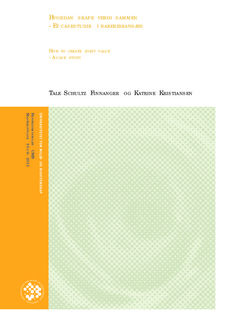| dc.description.abstract | Transaksjonskostnadsteorien sier at under like markedsforhold vil alle aktører anvende den samme styringsformen, da alle vil handle rasjonelt og benytte seg av den styringsformen som gir størst lønnsomhet til lavest usikkerhet (Ghosh & John 1999, Williamson 1981). Ved å gjennomføre et casestudie i industribakeribransjen ser vi at de største industribakeriene opererer under tilsvarende markedsforhold, men har ulike styringsformer.
Ved å benytte den anerkjente transaksjonskostnadsteorien, supplert med andre teoretiske tilnærminger til relasjonsstyring, ser vi på hvordan samhandling mellom to aktører i verdikjeden kan skape økt felles verdi. Vi ser på verdiskaping gjennom strategiske tilnærminger og hvordan innovasjon kan forbedre aktørenes posisjon både som kostnads- og differensieringsleder. Vi ønsker derfor å se på problemstillingen: hvordan påvirker samhandling mellom kunde og leverandør verdiskaping i industribakeribransjen.
Vi har en kvalitativ tilnærming til problemstillingen hvor vi ønsker å forklare innsamlet data basert på eksisterende teori. Vi har gjennomført dybdeintervjuer med åtte strategisk utvalgte respondenter i Mesterbakeren og Rema 1000, og benyttet en semi-strukturert intervjuguide.
Relasjonen mellom Mesterbakeren og Rema 1000 bærer preg av et asymmetrisk maktforhold, hvor dagligvarekjeden sitter med stor makt over industribakeriet. Som en konsekvens av dette rettes fokuset til begge bedriftene mot Rema 1000 sin strategi, ønsker og krav. Rema 1000 jobber med å tilby et bredt sortiment, med varer i forskjellig prisklasse og kvaliteter, som appellerer til størst mulig andel av den norske befolkningen. Dette har ført til at Mesterbakeren benytter store ressurser på produktinnovasjoner, da dette skaper direkte verdi for Rema 1000.
Rema 1000 sitter igjen med hovedandelen av marginene i bransjen. Så lenge Mesterbakeren fokuserer på å skape nye produkter basert på gammel teknologi vil de ikke klare å kapre større andel av dagens marginer. Ved økt fokus på prosessinnovasjoner kan de tilføre produktene nye egenskaper samt skape bedre prosesser og på denne måten skape økt verdi for kunden og redusere egne kostnader. Transaction cost theory states that under similar market conditions all participants use the
same form of governance; everyone will act rationally and make use of the governance form
that provides the greatest profit at the lowest level of uncertainty (Gosh & John 1999,
Williamson 1981). Conducting a case study in the industrial bakery industry shows that the
industrial bakeries operate under similar market conditions but with different forms of
governance.
Using the acclaimed transaction cost theory, supplemented by other theoretical approaches to
relationship management, we have seen how interaction between two actors in the value chain
creates greater joint value. We see value creation through strategic approaches and how
innovation can be used to improve a position both as a cost leader and a differentiation leader.
Our research question therefore becomes: how interaction between customer and supplier add
value within the bakery industry.
We have chosen a qualitative approach to address the research question, where we wish to
explain the collected data based on existing theory. We have conducted eight in-depth
interviews with respondents from Mesterbakeren and Rema 1000, this has been done by using
a semi-structured interview guide.
The relationship between Mesterbakeren and Rema 1000 is characterized by an asymmetric
power relationship, where the grocery chain has power over the industrial bakery. As a
consequence, both companies are focusing on the strategy, wishes and requirements of Rema
1000. The strategy of Rema 1000 is to offer a wide assortment of goods, with different price
range and qualities that appeal to a large proportion of the Norwegian population.
Mesterbakeren is therefore using significant resources on product innovations, as this creates
direct value for Rema 1000.
Rema 1000 are left with the majority of margins in the industry. As long as Mesterbakeren
keep focusing on creating new products based on old technology, they will not be able to
capture a larger share of current margins. With increased focus on process innovations they
can bring products new features and improve processes. In this way, they create added value for the customer and reduce their own costs. | no_NO |
